![]()
When Contributing Editor Matthew Peterson awarded Miracleman #15 an astonishing 6 out of 5 possible stars (fuzzy math here kids) in a recent Retro Review, one time Miracleman publisher, Dez Skinn, dropped by to comment on the article, which opened the door for an interview.
Dez Skinn was not only the publisher, but acted as editor for Miracleman while it was published in the UK under the Warrior banner. Alan Moore’s assignment to the title came directly from Skinn, thus providing Moore with the vehicle to launch his career as arguably the most revered comics creator of the 21st century.
I reached out to Skinn, inquiring if he would be willing to participate in an interview. He was receptive and very accommodating, granting Major Spoilers unprecedented insight into his professional endeavors. The man has been called the British Stan Lee and has been credited for his uncanny eye for talent. Of course, the impact of his success has sent ripples of controversy through the comics community. He addresses all of the questions with candor and insight, discussing The Past, The Present and The Future of Dez Skinn.
The Past
Major Spoilers: Can you tell me about your experience working with Stan Lee? What was the working relationship like?
Dez Skinn: I absolutely adored Stan. I never told him so, of course. But he could sell fridges to Eskimos and with sincerity, at that. Like many of us would love to be, he was a kid who never grew up. And why should he? He had all of those wonderful toys. Getting him drunk and comparing Tarzan calls was a highpoint.
I don’t think he EVER meant anybody harm or ill will. It was against his nature. It’s a shame some have demonized him so. At Marvel he was an employee though and sometimes he’d have a problem carrying out orders that would hurt people. Let’s be honest, that’s why eventually Jim Shooter was brought in…to tidy up Stan’s mess!
My working relationship with Stan was brilliant. He respected those about him and, as far as I was concerned, gave me a totally free hand. He actually said to me once that he’d wished he’d known as much about publishing as I did, when he was my age. What a charmer!
He’d occasionally advise me of things he’d learned, like a wise old uncle (how to deal with the press being one that sticks in my mind). But he was never dictatorial or even a little bit pushy. It just wasn’t his way.
Major Spoilers: When you were in charge of Marvel UK, you were responsible for bringing on some notable talent. For example, Grant Morrison did some stuff for you. Besides Morrison, what other names did you bring onboard?
Dez Skinn: Grant wasn’t around back then. That was during my Warrior phase a few years later. I brought in with me Dave Gibbons, Brian Bolland, Pat Mills, John Wagner, John Bolton, Paul Neary, John Stokes, Steve Dillon (aged 16), Steve Moore, David Lloyd, Steve Parkhouse…a whole bunch of folk I’d known either through prior endeavors or fanzines. Alan Moore did a tryout but it didn’t work. In fact when he resurfaced a few years later as a prospective writer for Warrior, I hadn’t even remembered his name. Although, because I never throw anything away, I recently found out he used to buy my old fanzines, so he’d obviously known me a lot longer than I’d known him!
Major Spoilers: You eventually left comics for a while until you returned with Quality Communications. What made you decide to come back and what was your primary mission statement with Quality?
Dez Skinn: I never really left. After Marvel UK, when I’d done what I set out to achieve (ie: my brief from Jim Galton and Stan; to turn the company around and make it profitable once more) I set up a design studio (Studio System) and still gave work to Steve Moore, Steve Dillon, Garry Leach, David Lloyd, John Bolton and a lot of the others. In fact it was at Studio System I did my biggest ever print run, half a million of a super-glossy painted Speedmaster comic (by artist Ian Kennedy).
I’d left Marvel UK because the intention to produce quality rather than just zipatoned reprints had rapidly turned into replicating quantity and that wasn’t what I wanted to do – or what my original brief had been. I’d done my job and turned the company around, so I wasn’t really needed there any more.
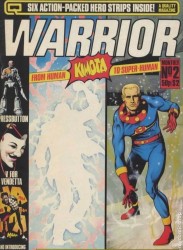 But as Studio System we were very much a service company, employed only when either the fashion or film industry needed us for magazines, promos, storyboards and the like. This meant some weeks staff were being paid to sitting on their hands, while other weeks we had to bring in extra freelance people. It was too seasonal. I wanted to be master of my own destiny again, so I started a new anthology comic with regular deadlines throughout the year.
But as Studio System we were very much a service company, employed only when either the fashion or film industry needed us for magazines, promos, storyboards and the like. This meant some weeks staff were being paid to sitting on their hands, while other weeks we had to bring in extra freelance people. It was too seasonal. I wanted to be master of my own destiny again, so I started a new anthology comic with regular deadlines throughout the year.
I named my new company Quality to remind me never to overstretch or get greedy!
Major Spoilers: The topic of Miracleman has been done to death, yet it arguably continues to be the focus of many conversations that invoke your name. From the outside looking in, the property has been as much of a blessing as a curse. Is that fair to say? What are some of your thoughts on the Miracleman ordeal?
Dez Skinn: Amazement. A lot of people who really should know better seem to delight in mouthing off their theories and opinions in public while others constantly rewrite history. I’ve always had the adage “If tha’s not got owt good to say, say nowt at all” (we speak like that in Yorkshire). I know exactly what happened, my memory isn’t addled by age, drugs or booze, and I never throw anything away, so I’ve reams of paperwork about virtually everything. But I fail to see why everything should be so public, it’s about the product. That’s what we should be striving to create and promote, not doing each other down. Third parties can make assumptions, but I’m amazed how few bother to check actual facts from sources before sounding off.
Major Spoilers: What did you think of the KIMOTA! Book?
Dez Skinn: Wonderful. Incomplete, but wonderful.
Creators
 Major Spoilers: How did you first come to work with Alan Moore? What was your impression of him?
Major Spoilers: How did you first come to work with Alan Moore? What was your impression of him?
Dez Skinn: I’d known Steve Moore (no relation) since the 1960s. Whenever I’d launched a new idea, Steve was one of the first people I’d speak to. But he really should have been Alan Moore’s agent! When I was producing a MAD-style humour magazine for Marvel UK (Frantic) Steve got me to run a two pager written and drawn by Alan. But it wasn’t very good really, not very memorable. Having edited MAD itself a few years earlier, I was very fussy about what I’d accept, so beyond that I never followed up with him.
Years later when I was putting a team together for Warrior, I wanted a token superhero. It was a typical British anthology-style package, so like the younger market weeklies it could reflect current trends without need for a relaunch. It reassures the trade to have continuity and it’s easy for an anthology to reflect science fiction, horror, war — whatever’s popular at any time — by changing cover characters. I must admit I think US comics lost their way when they dropped anthologies; they were great try-out vehicles for new ideas, too.
I’d had some success with bringing back a totally revamped Captain Britain at Marvel UK. I’d surprised those who’d care by only hinting at the character initially in a Black Knight strip but I didn’t see why I couldn’t do the same again outside of Marvel.
Mick Anglo (credited as the creator of Marvelman) had a certain reputation in the industry but I respected him for being a doer. As an editorial packager for small publishers, he could turn his hand to most things. He’d be given a budget and his income would be derived from not spending it all!
He’d been my first port of call when I wanted to move into comics in London. He’d not given me a job, but he’d passed me on to a company that did. So I thought it would be sweet to involve him in some way. So instead of a couple of other ideas I had, I set about reviving the old Marvelman.
You have to understand that when the original Marvelman comic was being produced, it was very much “off Broadway”. While the big publishers got national distribution, sales exceeding 300,000 copies a week, and full time staffs of four or five per title, Mick’s solo packaged titles for Len Miller were very pale shadows. They weren’t carried by the major federated trade and got most of their distribution through places like Woolworth’s. But their costs were so low, at only 24 pages with very cheap editorial, t they could get by on much smaller sales levels.
Bringing back Marvelman as opposed to simply creating a new character meant little as a sales booster. I doubt if we sold fifty extra copies because of the character (in fact hardcore fans apparently hated it). But we weren’t aiming at middle-aged nostalgia freaks and the direct market was virtually non-existent back then. It was a commercial nationally distributed title, which if it was good enough, I hoped would create its own audience.
Once I’d had a few meetings with Mick to discuss any clearance he knew needed addressing, I offered the strip to a few of my regulars including Steve Moore who told me a friend of his would kill to write it. He didn’t need to go that far, as nobody else wanted the commission. But Alan Moore did have to write the first installment on spec, because I wasn’t going to pay an unknown quantity if his work was unusable. Alan inundated me with material, the history, the extended synopsis, a real sales pitch. But he really needn’t have. The script was so bloody good, albeit somewhat overwritten, that he got the job!
In fact, I was so impressed by his work and so wanted to keep him in comics that I made a substantial loan to him so he could survive on such little work. He was only writing 12 pages an issue for me and didn’t have a great deal else to support his family on. But his enthusiasm was amazing. He’d send scripts in to me then immediately phone and insist on reading the whole things out. I’d say, “I’ll see it for myself tomorrow, Alan” but he’d still want to tell me the full story. In fact, some of the other writers expressed a certain jealousy about how close we were and how often he’d get the extra jobs!
He was impossible to deal with at times, but you expect that from ‘creatives.’ In retrospect I could have maybe handled him better but nobody ever said being an editor is easy.
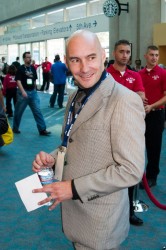 Major Spoilers: How did you first come to work with Grant Morrison? What was your impression of him?
Major Spoilers: How did you first come to work with Grant Morrison? What was your impression of him?
Dez Skinn: Grant was VERY different to Alan. Quiet and unassuming. Modest and shy. But then all creators are so different. Some desperately need reassurance and others just want to get on with things. Some need constant flattery, while others need a much firmer hand. Some deliver on time without prompting and others seem to forget what a deadline is. Grant simply delivered exceptional, inspired and on-time work. An editor’s dream.
Major Spoilers: Do you believe there to be a ‘feud’ between Morrison and Moore?
Dez Skinn: I really couldn’t say. I don’t read blogs and forums much at all and have no interest in third party speculation.
Major Spoilers: Here’s an excerpt from Kimota!, prompting my question:
George Khoury: You mention that Grant Morrison wanted to do a Marvelman story for Warrior.
Dez Skinn: He did one – a brilliant Kid Marvelman story. Nobody had heard of Grant back then. Grant came in at the tail end of Warrior and wanted to try his hand at “Marvelman” as Alan Moore had stopped writing it. […] Grant did submit a Kid Marvelman story, about a discussion between Kid Marvelman and a Catholic priest, and it was quite fascinating because Kid Marvelman argued a very good case against organized religion. Nobody was flying, no beams from anybody’s eyes, but a bloody clever script, clever enough that I sent it to Alan Moore for his opinion. Alan’s reply was, “Nobody else writes Marvelman.” And I said to Grant, “I’m sorry. He’s jealously hanging on to this one.” Grant did have an answer, but again, I shouldn’t really speak for him.”
Dez Skinn: Of course Grant was disappointed. Who wouldn’t be? As for Alan, it was his sandbox and at the time it was his call if he didn’t want to anybody else to play in it. Guess I shouldn’t have quoted him or used the word “jealously” to Grant – bit naughty, that!
Major Spoilers: Did you have any discussions with Grant or any other creators at the time regarding the Miracleman property?
Dez Skinn: No. He simply submitted a very clever little story on spec. It didn’t interfere with ongoing continuity and I was impressed with it. We’d used other artists so I thought why not another writer? That’s why I showed it to Alan. When he nixed it I gave Grant something else to write though, so the submission had fulfilled its purpose, it got Grant in.
The Present
 Major Spoilers: Your latest offering was Comic Art Now. What has been the response to the book and what was your process for putting it together?
Major Spoilers: Your latest offering was Comic Art Now. What has been the response to the book and what was your process for putting it together?
Dez Skinn: Wonderful. I’ve always hated that ad agencies rip-off comics work and get paid astronomical fees, so I wanted to put out a directory of comic artists, complete with contact details. Not only to show how wide the comic art medium is, but also so they’d get the lucrative advertising work instead of somebody simply copying them! I’d hope copies found homes in all the leading agencies. I’ve been told by a few that they did get extra work out of it, which is nice.
Major Spoilers: You have a comprehensive website that details your professional history. When did this site go live and what was the catalyst for creating it?
Dez Skinn: I started it a couple of months ago because I realised how invisible I am. Some people may have heard of me, but they’d no way of actually contacting me. It’s really just a giant business card and Curriculum Vitae rolled into one!
Controversy
Major Spoilers: Your name seems to invite controversy. There are not many individuals who have a Wikipedia page containing an entire subsection entitled Controversy. Is this just par for the course when considering your impact on the industry? What are your thoughts on detractors and negativity?
Dez Skinn: It’s funny, isn’t it? But I think too many people do the entire industry a great disservice by letting their frustration, jealousy and/or embitterment show. I doubt if the Clint Eastwood entry mentions his apparently huge ego, or the Hitchcock entry his weakness for blondes…but the comics industry? Sadly it still hasn’t grown up. And the few who are such public detractors and whingers don’t hurt individuals who simply get on with their job, but they can tarnish the total.
I know some people list every single achievement that they’ve made on there, but I tend to ignore Wiki and let other people add relevant career details, isn’t that what it’s for? But somebody did send me a great quote that I’ve got on the wall that a Wiki editor apparently made on my history page, or discussion page or whatever… “This is, without a doubt, the worst article I’ve ever seen in nearly four years here, and I say that not to criticize anyone, but to emphasize that it needs to be fixed.” Ral315 (talk) 00:57, 27 June 2008 (UTC).
Amusing and sort of flattering in a Bizarro way. Just a shame that some people’s energy can’t be more positively and creatively focused.
The Future
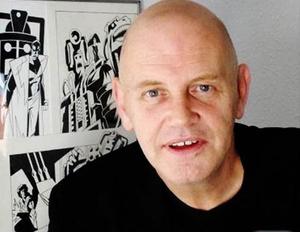 Major Spoilers: As someone who’s been entrenched in the comics industry for over 4 decades, what do you see for the future of the medium?
Major Spoilers: As someone who’s been entrenched in the comics industry for over 4 decades, what do you see for the future of the medium?
Dez Skinn: It needs the same kick up the pants that I told Todd McFarlane it needed about 15 years ago at a Wizard seminar. The narrowly focused direct market combined with glossy, overpriced and over-coloured printing has been a kiss of death. That and creatives running rampant with seemingly no editorial restraint, considered input or direction. Any gems get lost in a sea of replicated mediocrity desperately looking for a “graphic novel” or a film deal.
Major Spoilers: Do you have any Quality product that you’re considering for re-release? For example, one would think Grant Morrison’s Liberators would be a prime candidate.
Dez Skinn: Outside of my website reminiscing, I’m more interested in the future than the past. I might play with a few little projects from time to time, just to keep my hand in, but I’m really wanting to look towards the Next Big Thing and yes, I am working on it!
I’ve learned a lot over the years and really am keen to apply it. We all get better as we gain experience surely, and it’s a shame if we don’t do something with it. I’m constantly offering free consultancy to fledgling publishers. People I work with here say I should charge for it, I don’t believe others should make the same mistakes I’ve made. Whether it’s paper buying, contracts, launch promotions, formats, creatives, whatever it may be. I think we have a duty to pass on what we’ve learned or it dies with us and the next generation makes all the same mistakes again.
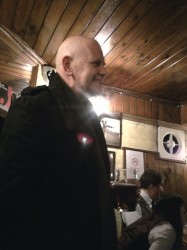 Major Spoilers: Do you think we’ll ever see the Alan Moore & Neil Gaiman Marvelman material reprinted by Marvel?
Major Spoilers: Do you think we’ll ever see the Alan Moore & Neil Gaiman Marvelman material reprinted by Marvel?
Dez Skinn: I really have no idea. I’d like to think so. It’s a shame such good material isn’t out there. It shouldn’t be about politics. If only people would be more honest and upfront, but then I guess I’m just a blunt old-school Yorkshireman who doesn’t see the point in lawyers. I had a very old-fashioned upbringing so I never lie, I never swear and I get very disappointed by how manipulative and untrustworthy the media and the system in general has become. People should talk to each other, sort out their differences and move on. Then everybody benefits. It’s pretty tragic the mess we’re in, really.
Major Spoilers: Generically speaking, I know that you talk about keeping the ‘business’ behind the scenes and letting the product speak for itself, but at the same time, you mention that the Kimota! book was ‘incomplete’ and that media doesn’t really dig in and check sources. So, in my mind at least, these two concepts seem a bit at odds with one another.
Dez Skinn: Not really. I read in one magazine, The Comics Journal I think, that I was “unavailable for comment” in connection with some Marvelman story. I think that meant they couldn’t be bothered ask me as it was some time during my editing Comics International, so I wasn’t difficult to find! As far as Kimota! is concerned, there’s a whole *massive* issue around certain ownership claims which has come to light, but not by them. I did put the two parties in touch with each other so George (Khoury) would be a little more aware and not look silly if he made any rash assumptions. If people ask, I tell them, but generally folk love to assume, particularly prevalent in this age of instant message board comments and using PRs as news stories.
Major Spoilers: You mentioned working on the Next Big Thing, what can you share about any professional projects you may have cooking?
Dez Skinn: Lots, constantly. I think I’ve been very lucky in my professional life. I’m not a particularly good writer or designer, and certainly not a very good artist, but I’ve been lucky to be able to meet and mix with some of the giants of our little world. As a catalyst, if by being daft enough to let my passion lead to constantly trying new things, I hope I’ve entertained people. If I’ve achieved anything of worth with any of them then that’s a bonus!



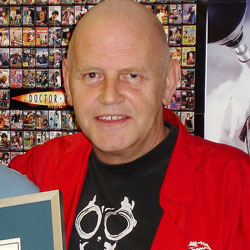
1 Comment
Thanks so much (to both of you, and MSP) for this interview. Dez (I can’t bring myself to write “Mr. Skinn”!) is IMO dead on about what the comic industry needs, and what has been the “kiss of death”.
His comments surrounding the “sea of replicated mediocrity” and seeming lack of editorial restraint” are particularly spot-on.
Keep the faith, brother! Thanks for your *work* in the industry, and I hope that we see at least a couple of next big things guided by your hands.